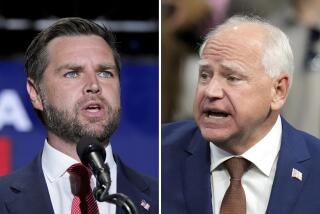Journalists’ Blather Hits New Lows in Debates
- Share via
Behold the popguns of October.
Surely there have been stories that TV journalists have covered as dimly as they have this year’s presidential debates between George W. Bush and Al Gore. Can you name one, though?
The low level of coverage--and high level of absurdity--have been stunning.
That has abated for the moment only because of interceding death and violence in the Middle East that threaten to spill even more blood and swell body counts before Tuesday night’s televised Debate Three.
But get ready for more crescendoing blab.
There are exceptions, of course. Yet in the main, TV reporters and pundits are redefining themselves as debate coaches as the presidential race enters its homestretch this month. Instead of asking what Bush or Gore must do to serve wisely and honorably in the White House, their questions about each man center on debate behavior and the image--not facts or policies--he must present on TV to prevail in November. It’s the horse race within the horse race. In other words . . .
“What does he have to do to win the debate?”
Forget that most journalists have no idea what it takes to “win” a presidential debate, witness their sage counsel to the usually assertive Gore that he apparently heeded, assuming an unnatural passivity while rendering himself a stone man in his second encounter with Bush.
The very idea that many journalists believe their role now is to give advice to candidates of either major party--in effect offering tips on how to sway voters through image rather than substance--is not only surreal but outrageous.
Here’s how to make the public think you’re wonderful, Al. Here’s how to sound like a PhD, George. It’s your freebie from your friendly strategists in the media.
Are they out of their minds? This goes against every tenet of journalism.
Imagine if TV covered this latest round of Middle East mayhem as it has the debates.
Question: What do Israeli leader Ehud Barak and Palestinian leader Yasser Arafat have to do to win global support?
Answer: Each must talk tough but not so tough as to appear unwilling to get to the table. Each must be sensitive to the other’s needs but not so sensitive as to appear insensitive to the needs of his own people. Each must be likable but not so likable as to appear weak and indecisive. Above all, each has to pronounce the other’s name correctly.
Q: Haven’t you forgotten something?
A: Oh, yes. They have to be entertaining.
That is the ticket, isn’t it? By constantly framing presidential debates as entertainment, in fact, TV journalists are creating expectations among voters that have no bearing whatsoever on the realities of good governance. And they use the expectations they created to justify their future reporting.
“We already had kind and nice,” someone said on CNN Friday in discussing the coming debate. “And we’re tired of that,” someone else added.
Somehow we feel cheated if we are not entertained by two men who aspire to head the planet’s most powerful nation and have a finger on the nuclear button?
Or see it as failure when they don’t come across as warm and fuzzy as fictional TV characters?
“How ridiculous it is that the most difficult thing about being elected is not knowledge, experience, priorities or the ability to see the big picture,” notes Amy Helperin Krivis of Tarzana in an e-mail that arrived after the second debate. “Apparently, the most difficult question addressing a candidate is, ‘Will they like me?’ The American people need to realize that they are not choosing a dinner date--they are choosing someone to run this country and represent us internationally.”
And about that post-debate coverage. There were a few TV stabs last week at noting the deceptions, misstatements and slippery Houdini moves of both candidates. Perhaps there would have been more of this had not the Middle East intervened.
But what was all that talk on TV about moderator Jim Lehrer shrewdly guiding Bush and Gore into a thoughtful examination of foreign policy, when all either man did was speak in platitudes and articulate a few broad principles he could have picked up in Poly Sci I? So based on that, Gore is still the maven? And Bush proved that he can keep up? Get outta here.
*
I’m a liberal Democrat, so bring on the charges of bias. Yet most of the TV journalists I heard sided with GOP spinners in setting the bar for Bush so low in advance of last week’s debate that all it took for him to be declared victorious and White House-ready was to show up and not foam at the mouth.
Once again, an e-mailer got it right. “They said that Bush had ‘exceeded the expectations set for him,’ ” writes John Pastoria from Studio City, who calls himself an Independent. “Translated that means everyone thought he was of average intelligence and knew little to nothing about foreign policy.
“People said he . . . would need to prove to them that he could ‘look presidential,’ ” Pastoria continued. “What happened? Everyone was thrilled and impressed that [he] was able to learn enough foreign policy to name the countries and remember what wars took place there. And in one month.”
What should Bush do to maintain that momentum? And what should Gore do to break Bush’s momentum? Stay tuned, for TV’s debate coaches are about to take the mike.
*
Howard Rosenberg’s column appears Mondays, Wednesdays and Fridays. He can be reached by e-mail at howard.rosenberg@latimes.com.
More to Read
Get the L.A. Times Politics newsletter
Deeply reported insights into legislation, politics and policy from Sacramento, Washington and beyond. In your inbox twice per week.
You may occasionally receive promotional content from the Los Angeles Times.










